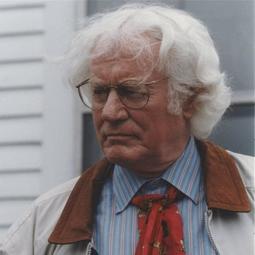 |
|
| Robert Bly | |
Robert Bly, the Minnesota poet, author and translator "who articulated the solitude of landscapes, galvanized protests against the Vietnam War and started a controversial men's movement with a bestseller that called for a restoration of primal male audacity," died November 21, the New York Times reported. He was 94. Bly's work included more than 50 books of poetry, translations of European and Latin American writers, and nonfiction commentaries on literature, gender roles and social ills, as well as poetry magazines he edited for decades.
In 1966, Bly co-founded American Writers Against the Vietnam War and toured the country, rallying the opposition with poetry "read-ins" on campuses and in town halls. He won the National Book Award for poetry for The Light Around the Body (1967), and donated his $1,000 prize to the draft resistance.
"Taking another abrupt turn in 1990, he published what was to become his most famous work, Iron John: A Book About Men, which drew on myths, legends, poetry and science of a sort to make a case that American men had grown soft and feminized and needed to rediscover their primitive virtues of ferocity and audacity and thus regain the self-confidence to be nurturing fathers and mentors," the Times wrote. The book was on the Times's bestseller list for 62 weeks, including 10 weeks at number one, and was translated into many languages.
Among the many media profiles of him was a 90-minute PBS special by Bill Moyers, who called Bly "arguably the most influential poet writing today." During the 1970s, he wrote 11 books of poetry, essays and translations. In the '80s and '90s, he produced 27 books, including The Man in the Black Coat Turns (1981), Loving a Woman in Two Worlds (1985) and Selected Poems (1986). His most recent book was Robert Bly: Collected Poems (2018).
"In recent years, he traveled widely, lecturing, reading poems and joining discussion panels, and in 2008 he was named Minnesota's first poet laureate by Gov. Tim Pawlenty," the Times noted. In 2004, he published The Insanity of Empire: A Book of Poems Against the War in Iraq, and in an introduction noted wryly that little had changed since Vietnam. "We are still in a blindfold," he wrote, "still being led by the wise of this world."
The Star Tribune noted that "in his heyday, Bly was known for making theater of poetry readings--reading poems twice, or three times, just because he loved their sound; reading other writers' work; wearing a rubber fright mask or an embroidered vest on stage; reading to the background music of drums and sitars. But despite his theatrics, he was always intensely serious about poetry and its importance in the cultural and political landscape. He was besotted by words."
In addition to the National Book Award, his many honors include the 2013 Robert Frost Medal, the Transtromer Poetry Prize in Sweden, and Guggenheim, Rockefeller and National Endowment for the Arts fellowships; and a McKnight Distinguished Artist Award in 2000.
"His last public reading was April 13, 2015, at Plymouth Congregational Church in Minneapolis where he launched the collection, Like the New Moon, I Will Live My Life," the Star Tribune noted. "One by one, 24 poets read their favorite Bly poems before Bly himself stood and read 'Moon Behind a Cottonwood Tree,' 'Arriving in the North Woods,' and the poem that had become his late-in-life anthem, 'Keeping Our Small Boat Afloat,' about survival, grace, and death. He thumped his cane on the wooden floor of the church in time with the words.... After that, he occasionally attended readings, sometimes leaving before they were over, but he did not read in public again."
From "Keeping Our Small Boat Afloat":
It's hard to grasp how much generosity
Is involved in letting us go on breathing,
When we contribute nothing valuable but our grief.
Each of us deserves to be forgiven, if only for
Our persistence in keeping our small boat afloat
When so many have gone down in the storm.

